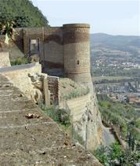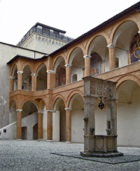Bernardo di Matteo Gamberelli, called Bernardo Rossellino, trained as an architect and sculptor in Florence in the 1420s. His most important commission in Florence was probably the monument (1444-7) to Leonardo Bruni in Santa Croce. He was papal architect to Pope Nicholas V (1447-55) and Pope Pius II (1458-64). Among his work for the latter was the design of the new city of Pienza in 1459-62.
Narni
Work on Rocca di Narni (1449)
In 1449 when Nicholas V visited Narni during the progress that he undertook in order to escape the plague in Rome, he commissioned Bernardo Rossellino to restore and strengthen the walls of the
Rocca. Giorgio Vasari was perhaps exaggerating as to the extent of this work when he said that Rossellino "rebuilt the fortress, enlarging it with good and beautiful walls".
Orvieto
Fortress (1450-7o)
In 1449, when Nicholas V regained control of Orvieto from its warring factions, he commissioned Bernardo Rossellino to build this fortress on the foundations of the Rocca dell’ Albornoz. Giorgio Vasari wrote that Rossellino "made a great fortress with a most beautiful palace - a work of great cost and no less magnificence". Pius II who visited Orvieto in 1460, recorded that: "Pope Nicholas V ... began the construction of a fortress in a corner of the city. It is still unfinished but it is guarded, and it is not easy to take because it is protected by high cliffs and a deep moat”. His successor, Pope Paul II completed the work in ca. 1470. (The structure is now largely destroyed).
Perugia
Campanile (largely rebuilt in 1463-8)
The original campanile of the church of
San Pietro suffered from fires and wars to the extent that its upper part had to be demolished in 1393. Bernardo Rossellino designed the new upper structure, which was built on the surviving base. This structure, which comprises a ten-sided tower with a hexagonal enclosure for the bells below the pointed roof, was modelled on the campanile of the
Duomo, Pienza, which Bernardo Rossellino had designed for Pius II in 1459-62. He sent the design from Pienza, and the work was carried out by
Giovanni di Betto and
Pietro da Firenze, who were probably members of his workshop.
Spoleto
Work on Rocca di Spoleto (1449)
Nicholas V appointed his half brother, Cardinal Filippo Calandrini as castellan of the
Rocca in 1447. Andreola Tomeo dei Bosi, the mother of both men, lived here from 1447 until her death in 1451. He stayed with his family in the Rocca in 1449 during the progress that he undertook in order to escape the plague in Rome. According to Giorgio Vasari, he employed Bernardo Rossellino, who made "within it dwellings so beautiful, so commodious and so well-conceived that nothing better could be seen".
This work probably involved the Cortile d' Onore, at the heart of the residential part of the Rocca: the hexagonal well at its centre is decorated with the arms of Nicholas V.







